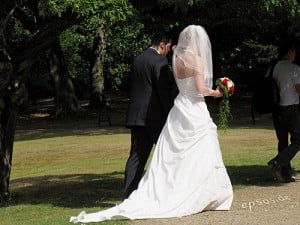The Mortgage Planner’s Corner | How To Control Your Wedding Expen$e$
Getting married is a big event. Gathering friends and loved ones together to take part gives the day greater meaning, and following up with a party to celebrate is perfectly natural.
The party, however, can take on a life of its own, with expenses spiraling out of control. A poll taken by wedding site TheKnot.com placed the combined cost of the average wedding and reception at $25,000: the cost of a nice car. Granted, many weddings cost far less, but $25,000 is an average – so plenty break that budget too.
Wedding planning requires toughness
No one sets out to go broke on a wedding, yet many couples end up spending more on a wedding than they would on a starter house. The fact is,
there is an entire industry built around weddings, and add-ons and options will be coming at you from all angles. If you don’t take steps early on to control expenses, you might find yourself blowing past your budget and heading deep into debt. Read on as we explain the hows and whys of responsible wedding planning.
Plan to stay within budget
Controlling expenses early is key, because as you start to spend more it becomes harder for you to keep perspective on how much is being spent. The more you have already dished out, the smaller each new expense will seem in comparison. This size distortion is part of human nature, and the reason why we don’t balk at the $100 hidden fee that appears just as we’re about to make a big purchase like a car or boat. A short person looks even shorter when there is a tall man next to them, and these little expenses are going to look insignificant next to the huge amounts of money you will have paid out by the end of the wedding. “It’s only $100” is the common rationale. Just remember that these expenses seem small now, but can be painful in retrospect.
Put another way, by planning to save money early on, you’re making choices before the big price tag on the wedding distorts your sense of value. Some early decisions that can make a big difference include:
Guest list– Each additional guest bumps up the price of the wedding by an increment. Pay close attention to your list, and you could save a bundle by keeping the list down as much as possible.
Food and drink– Are you going to offer a set menu or options? What about a buffet? Open bar versus a limited bar can make a huge difference too. (For more specifics, read our story 10 Ways to Cut Wedding Food Costs.)
Date and venue– Most regions have a wedding “season,” and people getting married during that season will face much higher prices than those who wait for a slower time. Consider a destination wedding, traveling somewhere beautiful with a small, core group of guests. It’s cheaper — and comes with a built-in honeymoon.
Don’t believe the hype
Whether you’re getting married on the beach or in a giant downtown chapel, weddings are still big business. There are hundreds of variables, and each “premium” option you pick can subtly raise the price tag on your wedding day. That’s why you need to be clear from the beginning about what matters to you — and what doesn’t. You need to decide what details are really worth shelling out for and what to let slide. Otherwise, you’ll be making these decisions in the moment, and asking the caterers if you really need a champagne parade is like asking a car salesman if you really need the premium stereo package.
Each of these people is a salesperson, and they will do their best to convince you that without whatever it is they’re selling, your wedding day will be missing something. If you go to a salesman without an idea of what you want to buy, they will try to sell you something, and it may not be the right fit for you. So, decide what you’re willing to splurge on, and don’t shell out for X, Y or Z just because a wedding magazine says you need to. It’s your day, so do what makes you happy.
Communicate early and often
So, if you understand the importance of deciding early, what should you do? You’ll need a plan, and that means having a clear-headed discussion with your spouse-to-be. Sit down together early and often to discuss your expenses. Get clear on your budget for the wedding, and if you’re fortunate enough to have financial support from parents, get clear on what scale is reasonable for them. Speak up, and talk about what’s important to each of you.
Most of the time, women have much stronger opinions on wedding planning than men. This isn’t just a gender issue; women have been targeted since they were kids with images of brides and massive banquet halls full of dancing guests. So the man in the couple might need to play the voice of reason. As a team, you need to pick and choose which parts of that fantasy are right for you, and what you can afford to save some money on.
Wedding planning won’t kill you
Like we said in the beginning, the key to wedded financial bliss is minimizing expenses early. We’re not saying to eliminate them, just minimize: Identify what’s unnecessary and unwanted — and get rid of it. This frees more of your money and energy for the things you do want to have. If something is important to you, by all means go for it. But don’t let size distortion and pushy salespeople take more money from you than you can afford to spend. What truly matters at a wedding is the ceremony, and any happiness or enjoyment you can afford to share with your family and loved ones on top of that is a bonus.
Wedding Planning: Control Expenses Early was provided by AskMen.com.
Jesse Ibanez – REALTOR – 858.863.0263
Jeremy Beck, David Hughson – Mortgage Planners

